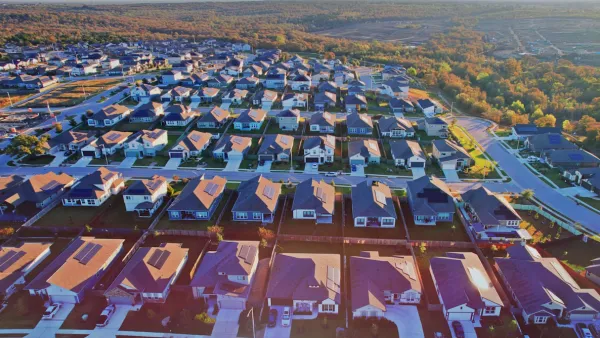Could it be that places for the dead might be a new source of urban innovation? Austin provides an example of new thinking regarding urban resting places.
Anna Clark undertakes an examination of the land use and design challenges presented by cemeteries and other sites for honoring the dead.
First Clark establishes the challenges:
"As the meeting point between the living and the dead, cemeteries are peculiarly fraught ground. That makes them easy for cities to ignore. Crime, environmental problems, historic preservation, social class, religious traditions, and the thorny legacy of who is included in cities, and who is not, all come crashing together in urban cemeteries. It’s a toxic tangle of priorities that often contradict each other, and when the cemeteries are on public land, they are an endless drain on city budgets. If no descendants are around anymore to care, if eroded grave markers make it hard to even tell who is buried where, is there any harm in letting nature run its course?"
In Austin, Texas, however, planners are looking for new ways to negotiate these tricky questions:
"The city is creating its first-ever master plan for five municipal cemeteries, the oldest of which dates to the founding of Texas’ capital city in 1839. The proposed plan — a 542-page behemoth — debuted in January. It details a rehabilitative approach to historic cemeteries: protecting their character through repair of gravestones, relics, and plant life, expanding visitor services, and developing interpretive programming that, in effect, returns cemeteries to their origins as public parks."
Scott notes that the cities of Sacramento, California and New Braunfels, Texas are the only cities in the country with cemetery master plans, so Austin's planners don't exactly have a great deal of precedent to go on in their efforts.
The long article goes into a lot more detail about the design and planning solutions that Austin, and other cities, could potentially devote to their cemeteries.
FULL STORY: Designing for the Dead: The Perfect City Cemetery

Planetizen Federal Action Tracker
A weekly monitor of how Trump’s orders and actions are impacting planners and planning in America.

Maui's Vacation Rental Debate Turns Ugly
Verbal attacks, misinformation campaigns and fistfights plague a high-stakes debate to convert thousands of vacation rentals into long-term housing.

San Francisco Suspends Traffic Calming Amidst Record Deaths
Citing “a challenging fiscal landscape,” the city will cease the program on the heels of 42 traffic deaths, including 24 pedestrians.

Defunct Pittsburgh Power Plant to Become Residential Tower
A decommissioned steam heat plant will be redeveloped into almost 100 affordable housing units.

Trump Prompts Restructuring of Transportation Research Board in “Unprecedented Overreach”
The TRB has eliminated more than half of its committees including those focused on climate, equity, and cities.

Amtrak Rolls Out New Orleans to Alabama “Mardi Gras” Train
The new service will operate morning and evening departures between Mobile and New Orleans.
Urban Design for Planners 1: Software Tools
This six-course series explores essential urban design concepts using open source software and equips planners with the tools they need to participate fully in the urban design process.
Planning for Universal Design
Learn the tools for implementing Universal Design in planning regulations.
Heyer Gruel & Associates PA
JM Goldson LLC
Custer County Colorado
City of Camden Redevelopment Agency
City of Astoria
Transportation Research & Education Center (TREC) at Portland State University
Jefferson Parish Government
Camden Redevelopment Agency
City of Claremont




























